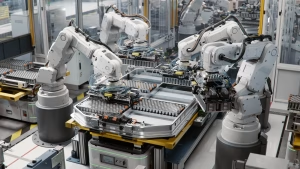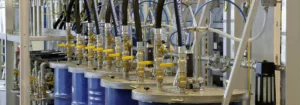When selecting a motor for industrial use, the choice between air motors and electric motors depends on your specific operational needs. Each motor type offers unique advantages and limitations, making it essential to evaluate factors like efficiency, environmental conditions, control requirements, and safety.
What Are Air Motors?
Air motors, or pneumatic motors, convert compressed air into mechanical energy. They are compact, lightweight, and ideal for environments where space constraints, safety, or harsh conditions are a concern.
✅ Advantages of Air Motors
- Durability: Resistant to dust, moisture, and extreme temperatures.
- Rapid Start/Stop: Ideal for frequent cycling operations.
- Variable Speed & Torque: Easily adjusted via air pressure and flow.
- Intrinsic Safety: No sparks or heat generation—perfect for explosive or flammable environments.
- Overload Protection: Excess air is vented without damaging the motor.
⚠️ Disadvantages of Air Motors
- Lower Efficiency: Compressed air systems lose energy during generation and distribution.
- Higher Operating Costs: Air compressors and maintenance add to long-term expenses.
- Noise Levels: Can be loud, especially at high speeds.
- Environmental Impact: Compressed air systems may increase energy consumption.
What Are Electric Motors?
Electric motors convert electrical energy into mechanical motion. They are widely used due to their efficiency, control precision, and availability in various sizes.
✅ Advantages of Electric Motors
- High Efficiency: Lower energy consumption compared to air motors.
- Precise Control: Speed and torque can be finely tuned using electronic drives.
- Quiet Operation: Suitable for noise-sensitive environments.
- Environmentally Friendly: Can be powered by renewable energy sources.
- Versatility: Available in a wide range of power ratings and configurations.
⚠️ Disadvantages of Electric Motors
- Environmental Sensitivity: Vulnerable to moisture, dust, and temperature extremes.
- Overheating Risk: Requires proper ventilation and load management.
- Complex Maintenance: May involve more intricate diagnostics and repairs.
How to Choose Between Air and Electric Motors
Consider the following factors when selecting the right motor for your application:
- Operating Environment: Is the area dusty, wet, or explosive?
- Energy Efficiency: Are long-term energy costs a concern?
- Speed & Torque Needs: Does your process require variable control?
- Noise Sensitivity: Is quiet operation important?
- Safety Requirements: Are there risks of sparks or overheating?
- Initial vs. Long-Term Costs: Balance purchase price with maintenance and energy use.
- Maintenance Complexity: How often and how easily can the motor be serviced?
- System Integration: Will the motor fit into your existing infrastructure?
Additional Considerations
- Certifications: Explosion-proof or food-grade requirements.
- Future Scalability: Will your needs grow or change?
- Local Regulations: Ensure compliance with safety and environmental standards.
Conclusion
Both air motors and electric motors have their place in industrial applications. By understanding their strengths and limitations, you can make an informed decision that improves efficiency, safety, and performance.
Are you looking for more information? If you have any questions about how the air motor might be used in your application, feel free to reach out to us anytime.


